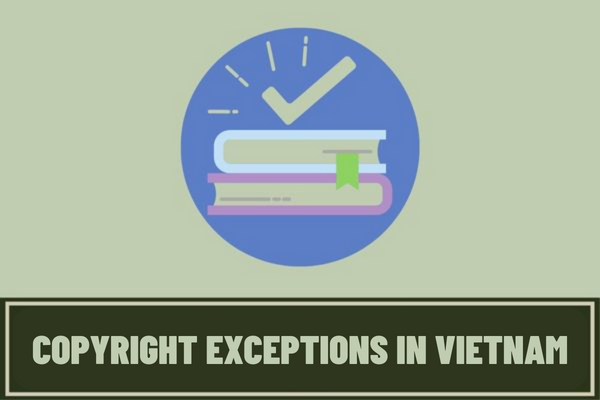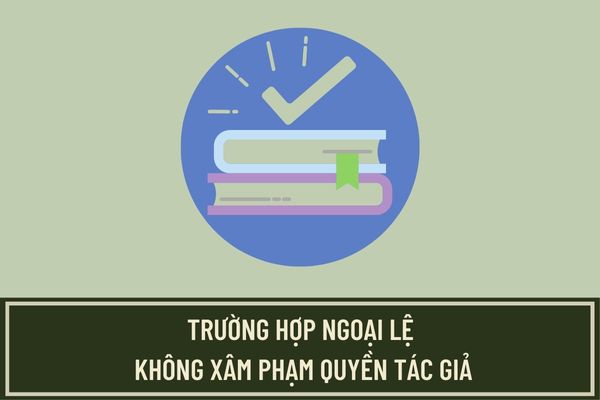What are the copyright exceptions in Vietnam according to the current regulations?
Is the user making a copy of work for scientific research considered an infringement of copyright and subject to payment of royalties?
Pursuant to Clause Article 25 of the 2005 Law on Intellectual Property in Vietnam (amended by Clause 7, Article 1 of the 2022 Law on amendments to some articles of the Law on Intellectual Property) as follows:
Copyright exceptions
1. Cases in which a published work may be used without permission or payment of royalties except provision of information about the author and origin of the works:
a) The user makes a copy for the personal purpose of scientific research or study and of a non-commercial nature. This does not apply if the copy is created using a copying device;
…
Thus, in case the user makes a copy for the personal purpose of scientific research or study and of a non-commercial nature, it is not considered copyright infringement and does not have to pay royalties. However, the above provision does not apply if the copy is created using a copying device.
What are the copyright exceptions in Vietnam according to the current regulations?
What are the copyright exceptions in Vietnam?
Pursuant to Article 25 of the 2005 Law on Intellectual Property in Vietnam (amended and supplemented by Clause 7, Article 1 of the 2022 Law on amendments to some articles of the Law on Intellectual Property) stipulating as follows:
Copyright exceptions
1. Cases in which a published work may be used without permission or payment of royalties except provision of information about the author and origin of the works:
a) The user makes a copy for the personal purpose of scientific research or study and of a non-commercial nature. This does not apply if the copy is created using a copying device;
b) The user reasonably reproduces part of the work using a copying device for the personal purpose of scientific research or study and of a non-commercial nature.
c) The user reasonably uses the work to as illustration in a lecture, printed matter, performance, audio or video recording, broadcast for teaching purposes. This may include sharing the work in a local network, provided technical measures are taken to make sure that it is only accessible to the teacher and the learners in that session.
d) The user uses the work in public service activities of state agencies;
dd) The user reasonably cites the work without misrepresenting the author's views to comment, introduce or illustrate in the user's own work, to write a news article or periodical, in a broadcast or documentary;
e) The user uses the work for library operation of a non-commercial nature, including reproducing works being stored in the library for preservation, provided these copies are marked as archived copies and have restricted access in accordance with regulations of law on library and archiving; reasonably reproduces part of the work using a copying device serving another person's research or study; reproduces or sends the archived work on the inter-library network, provided the number of concurrent readers do not exceed the number of copies held by these libraries, unless otherwise is permitted by the right owner. This does not apply if the work has been digitally released;
g) The user performs a theatrical work, musical work, dance or work of other art forms during a cultural event of a non-commercial nature;
h) The user photographs, telecasts an fine art, architectural, photographic, or applied art work displayed at a public place for introduction of such work of a non-commercial nature;
i) The user imports copies of another person's work for personal use of a non-commercial nature;
k) The user reproduces the work by publishing on a newspaper or periodical, broadcasts or otherwise publicly present the lecture or speech or talk within an appropriate scope for the purpose of news production, unless the author announces he/she holds the copyright;
l) The user photographs, makes an audio or video recording, or broadcasts an event in which the work is heard or seen for the purpose of news production;
m) A person who has visual impairment or any impairment that render him/her unable to read printed text or read the work in a conventional way (hereinafter referred to as "disabled person) and his/her carer who satisfies the conditions specified by the Government uses the work in accordance with Article 25a of this Law.
2. The use of a work in the manners specified in Clause 1 of this Article must not contradict the normal use of the work and must not cause unreasonable damage to the lawful interests of the author or copyright owner.
3. Regulations on reproduction specified in Clause 1 of this Article do not apply to architectural works, fine art works, computer programs, collection and compilation of works.
4. The Government of Vietnam shall elaborate this Article.
Thus, the copyright exceptions include the above 11 cases.
What are the regulations on moral rights of authors in Vietnam?
Pursuant to Article 19 of the 2005 Law on Intellectual Property in Vietnam (amended by Clause 5, Article 1 of the 2022 Law on amendments to some articles of the Law on Intellectual Property) stipulating as follows:
Moral rights
Moral rights of authors include:
1. The right to name their works.
Authors are entitled to transfer the right to name their works to other organizations and individuals as prescribed in Clause 1 Article 20 of this Law;
2. The right to have their real names or pseudonyms attached to their works; the right to have their real names or pseudonyms announced when their works are published or used;
3. The right to publish or permit other persons to publish their works;
4. The right to protect the integrity of their works; and to forbid other persons to modify, edit or distort their works in whatever form, causing harm to the honor and reputation of the author.
Thus, moral rights of authors include:
- The right to name their works.
- The right to have their real names or pseudonyms attached to their works; the right to have their real names or pseudonyms announced when their works are published or used;
- The right to publish or permit other persons to publish their works;
- The right to protect the integrity of their works; and to forbid other persons to modify, edit or distort their works in whatever form, causing harm to the honor and reputation of the author.
LawNet
